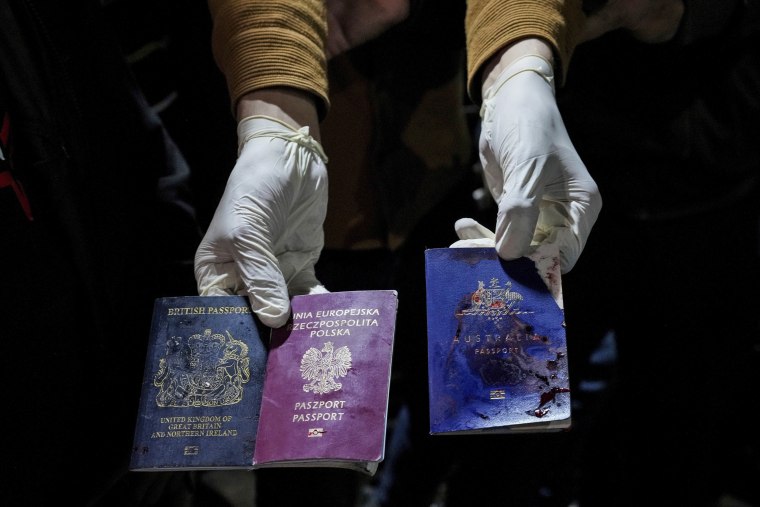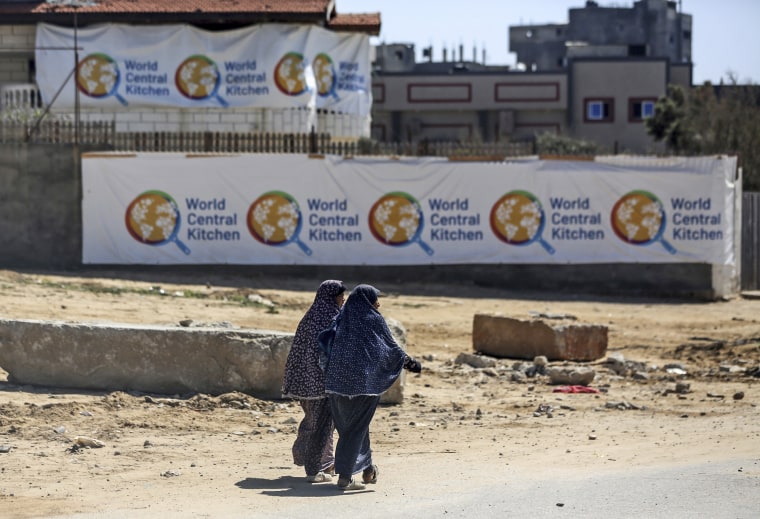World Central Kitchen aid worker killings were not an isolated incident, but a
The killing of seven aid workers from World Central Kitchen may mark a turning point in support for Israel and for long frustrated efforts to bring relief to Palestinians on the brink of starvation.
But while the IDF investigation suggests this was an isolated “grave mistake,” the mounting toll faced by aid agencies throughout the war points instead to what they say are systemic failings in the IDF’s approach to protecting humanitarian workers in the Gaza Strip. According to the United Nations, a total of 224 humanitarian aid workers have been killed since the start of the war.
Monday’s strike has inflamed global outrage that has coalesced into international pressure, forcing Israel to open new points of entry for humanitarian aid.
Israeli officials, including Prime Minister Benjamin Netanyahu, have issued rare expressions of contrition at the killings, and the IDF said Friday that it had removed two senior officers from their posts after a probe found the targeting of the aid convoy with three successive missile strikes to be in violation of IDF protocol.

In a briefing on Friday, the IDF said WCK had coordinated its movements with Israeli authorities correctly, but the officers committed three errors. First, they either didn’t see or did not read a message identifying the convoy. They then decided to fire at the vehicle with insufficient cause, saying that one of the soldiers had identified someone entering one of the vehicles carrying what he thought was a gun but was instead likely a bag. The third mistake, the IDF said, was that it continued to strike, not just the first car, but the second and the third.
“The essential problem is not who made the mistakes,” António Guterres, the United Nations’ Secretary-General said on Friday in response to the IDF’s investigation, “It is the military strategy and procedures in place that allow for those mistakes to multiply time and time again.”
Unlike the killing of the WCK staff members, who were citizens of the U.S., Canada, Australia, Poland, and the U.K., other fatal incidents that have involved mostly Palestinian aid workers have raised little outrage or notice from the Israeli or international governments.
In a review of documents, public statements, and interviews, NBC News found a pattern of attacks on aid workers and humanitarian infrastructure in the months leading up to Monday’s attack. Those include two previous incidents involving WCK, the dropping of a 1000-pound bomb near a building housing aid workers from the International Rescue Committee (IRC), and the bombing of the home of an aid worker for Doctors Without Borders/Médecins Sans Frontières (MSF).
UNRWA, the U.N. agency for Palestinian refugees, has sustained more attacks than any other agency, resulting in the death of 179 of its staff since Oct. 7.
The attacks have resulted in the direct curtailment of aid deliveries to Gaza’s starving population. Following Monday’s killing, at least four organizations stopped the delivery of aid into Gaza, citing danger to its staff, including WCK, which turned around three cargo ships en route to Gaza, returning 240 metric tons of much-needed food aid to port in Cyprus.

But even prior to that, destruction and ongoing hostilities as well as the ensuing lawlessness had been choking off aid deliveries to much of Gaza, particularly in the north, where the threat of starvation is most acute. To work in a war zone, aid agencies rely on a process called deconfliction, which allows the military to take measures to prevent unintentional attacks against aid workers, who are protected by international humanitarian law. In Gaza, agencies notify the Coordination of Government Activities in the Territories, or COGAT — the official Israeli government body that liaises between aid agencies and the military and also controls access for staff and aid shipments into Gaza — often daily, of the movements of their convoys, and provide the coordinates of their guesthouses and warehouses.
Still, they were repeatedly attacked.
“The deconfliction system is effectively a fiction,” said Ciarán Donnelly, Senior Vice President for Crisis Response Recovery and Development at the IRC.
In a news conference on Thursday, Christopher Lockyear, Secretary General for MSF said, “This pattern of attacks is either intentional or indicative of reckless incompetence. It not only shows the failure of deconfliction measures, it shows the futility of these measures in a war fought with no rules.”
That…
Read More: World Central Kitchen aid worker killings were not an isolated incident, but a

